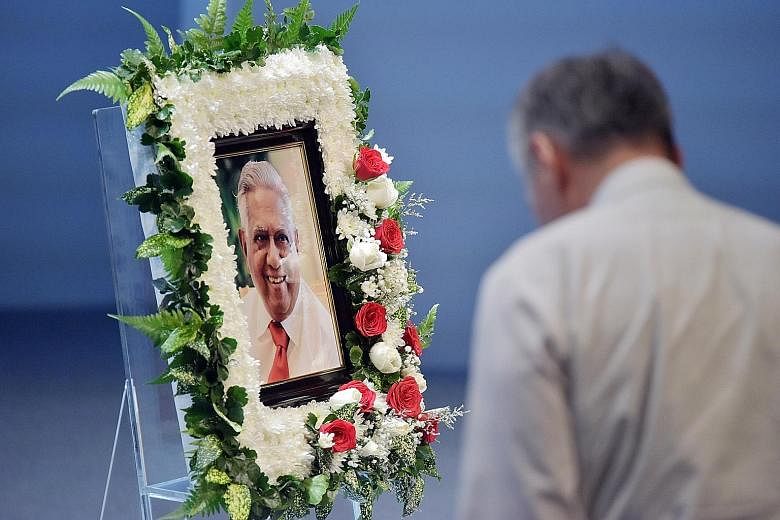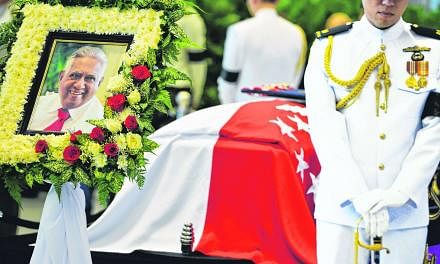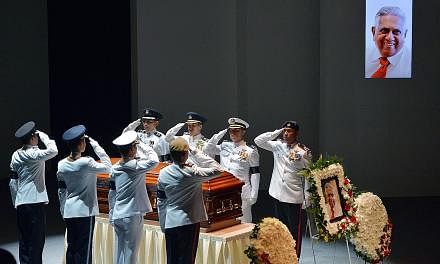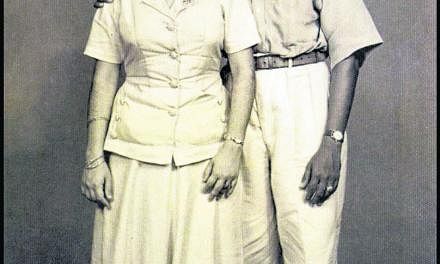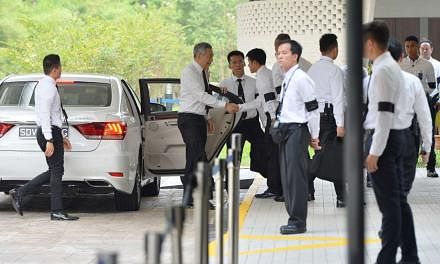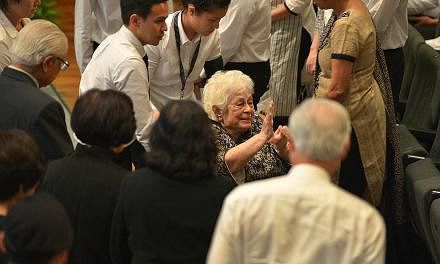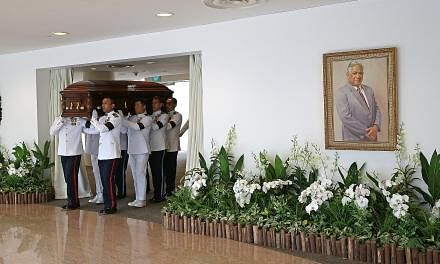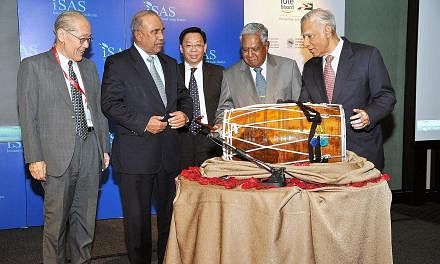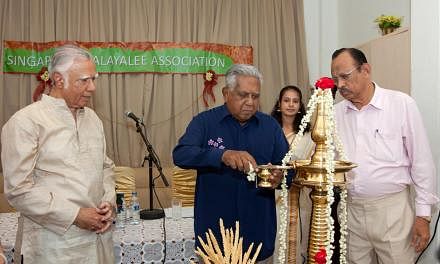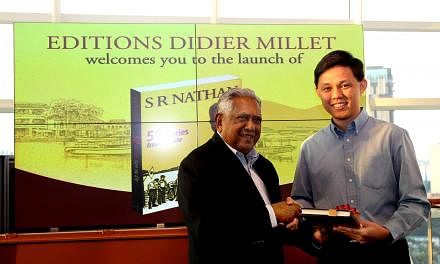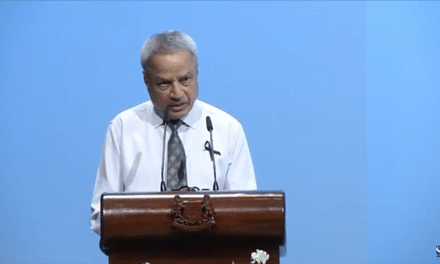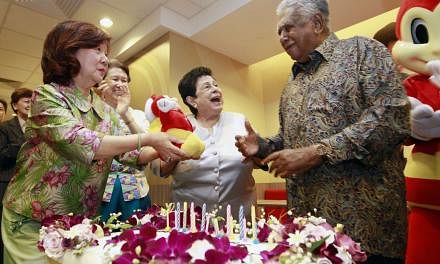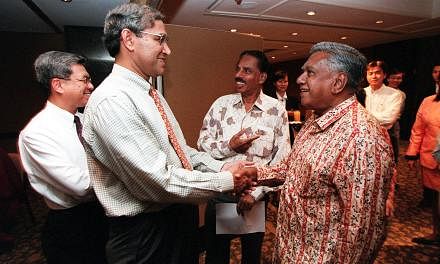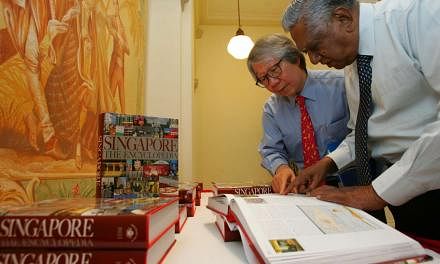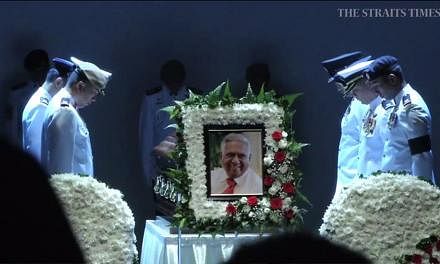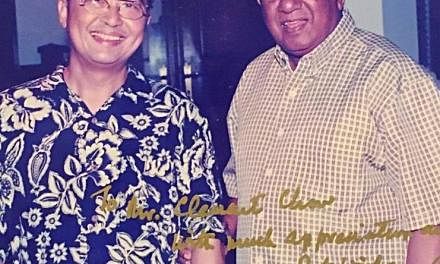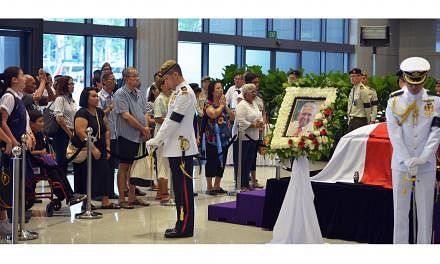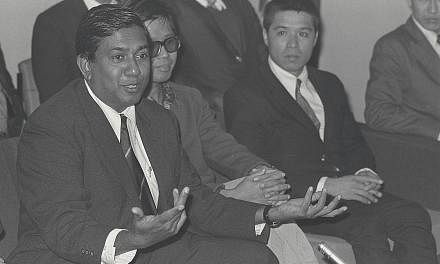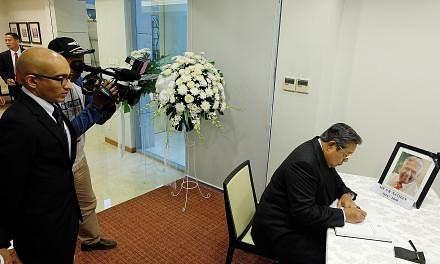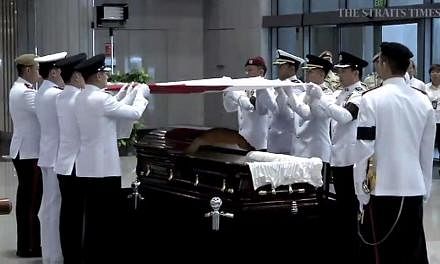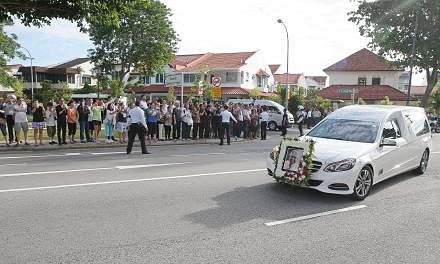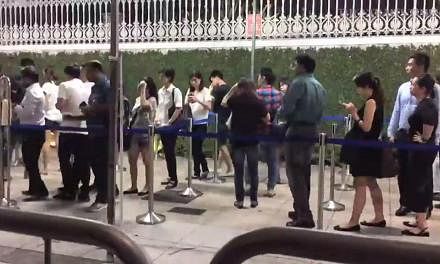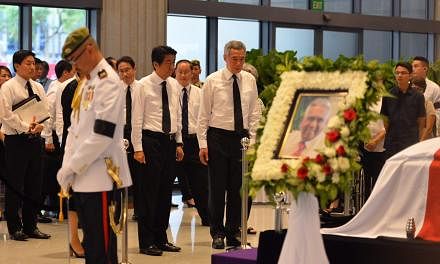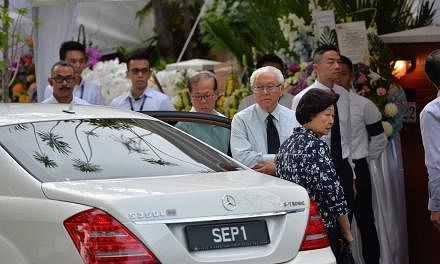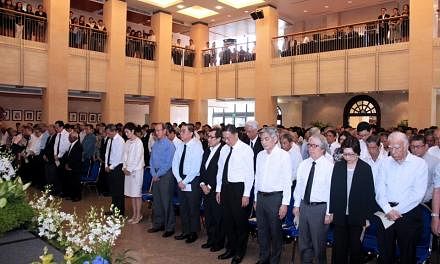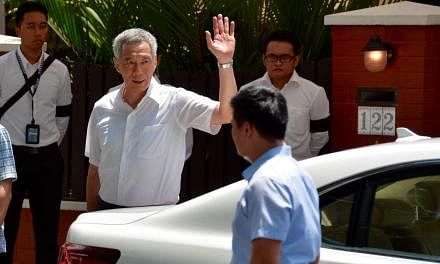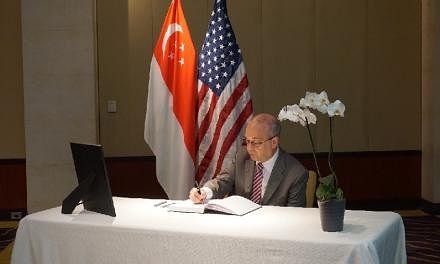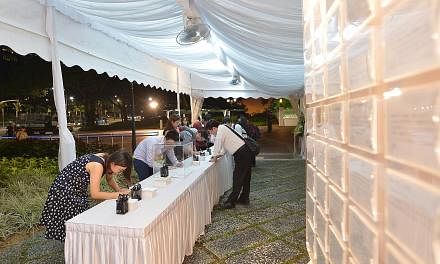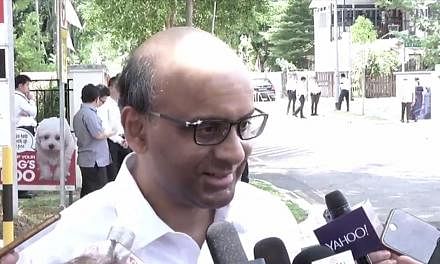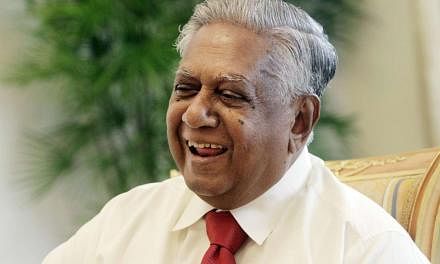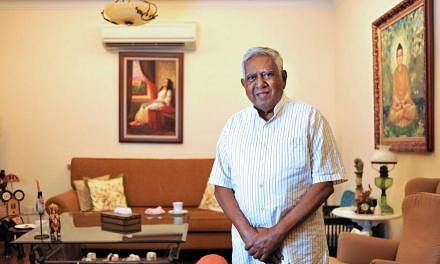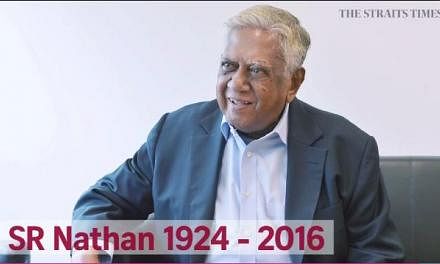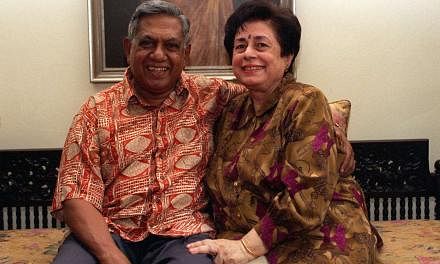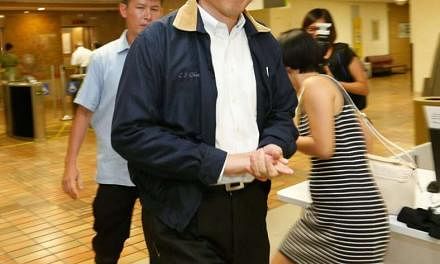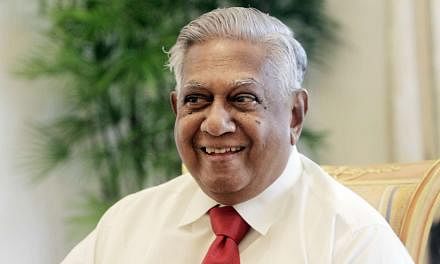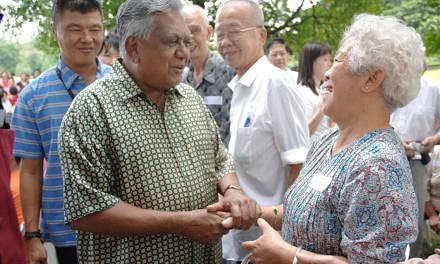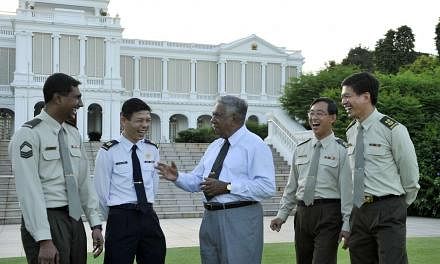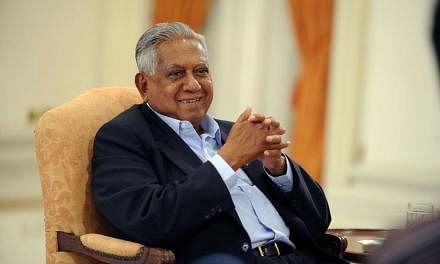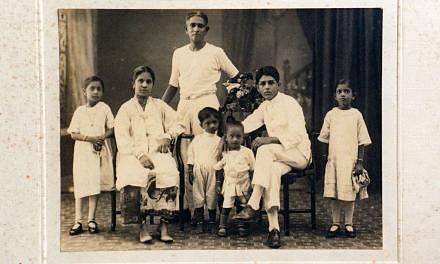As one of the pioneer generation who lived through Singapore's most tumultuous period, Mr Nathan witnessed many of the key events that shaped our nation. He not only had a front-row seat, but was often an actor on stage. He played a significant and influential role in our nation-building.
From a most humble beginning, Mr Nathan built a unique and illustrious public service career. He served in diverse fields, from social work to trade unions to intelligence, diplomacy, journalism, academia and finally as president. He played a leadership role in the Indian community. But he was also a president for all Singaporeans, and cared deeply about racial and religious harmony.
Quite apart from Mr Nathan's remarkable career, the central and brightest thread in his life was his love for Umi. He first set eyes on her in 1942, when she was 13 and he 18. After a courtship of 16 years, braving parental objections and a two-year separation while Umi studied in the UK, they married in 1958. Their relationship spanned an astonishing 73 years, an inspiration to us all. SR loved and honoured Umi all the days of his life. And she in turn was his anchor throughout his career, including the 12 years that he was president, when she supported him with grace, charm and warmth. Mrs Nathan, thank you.
I have had the honour and privilege to know and work with Mr Nathan for over 40 years, in different capacities: first as a young SAF officer when Mr Nathan was director of the Security and Intelligence Division (SID), then as a minister, when Mr Nathan served as a diplomat, and later, as Prime Minister, when Mr Nathan was president.
When I think of Mr Nathan, four things come to mind. First, he was a man who lived fully, seizing all that life had to offer.
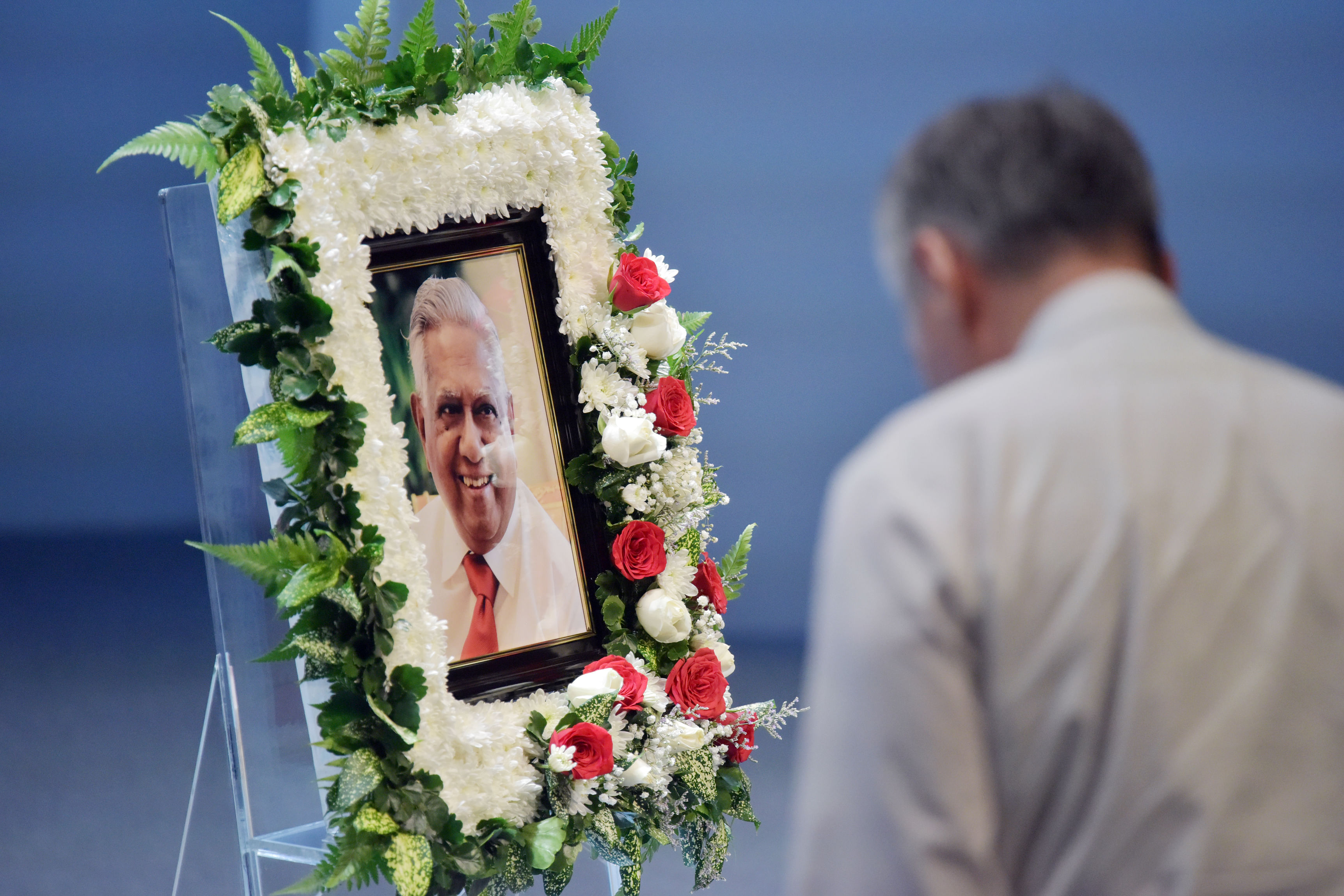
Second, he never gave up, no matter what the difficulties and dangers. Nor did he indulge in self-pity or look to others for help. Instead, he faced challenges head-on with a steely resolve and ultimately prevailed.
Third, he always did his best for Singapore, even at personal risk and sacrifice. Whatever the mission, he answered duty's call. Singapore could absolutely rely on his loyalty and dedication. Few have answered the nation's calls so faithfully and so often, and served Singapore so well.
Fourth, he had great personal integrity and commitment. It was his character, as much as his intellect, that led to his achievements in life and took him to the highest office in Singapore.
The one incident that best epitomises Mr Nathan's qualities is the Laju incident. In 1974, two Japanese Red Army terrorists and two terrorists from the Popular Front for the Liberation of Palestine tried to blow up the Shell refinery on Pulau Bukom. They failed, and hijacked the Laju - a ferry boat operating between Bukom and mainland Singapore. The Government negotiated a deal with the terrorists to release their hostages in exchange for safe passage to the Middle East. Mr Nathan, then director of SID, risked his life to lead a team of 13 officials who accompanied the terrorists to Kuwait on a Japan Airlines plane. The terrorists had demanded their presence to guarantee the safe passage. The Singapore officials were, in fact, hostages.
Not many of today's generation know of the Laju incident. Those who do probably do not fully appreciate the magnitude of the decision that Mr Nathan and the other 12 made. It took great moral and physical courage. In an interview near the end of his term as president, Mr Nathan was asked if he thought he would return alive. He said: "I was not sure. Because what awaited us at the other end was something uncertain."
After Mr Nathan retired from Government in 1982, Prime Minister Lee Kuan Yew asked him to be the executive chairman of The Straits Times Press. This was new and uncharted territory for him. Eyed suspiciously as a former government man, he was hardly welcomed with open arms by the journalists. But his sincerity won them over. He spent six years there. In his gentle but effective manner, he helped the journalists understand our unique context as a young nation, and gave them the support and the space to run a high-quality, successful newspaper.
In 1988, Mr Nathan became high commissioner to Malaysia. He hosted me later that year, when I went up to Kuala Lumpur to speak to the Harvard Club of Malaysia. My theme was the longstanding ties between Singapore and Malaysia. On reading my draft speech, Mr Nathan shared with me his own personal example. After the war, he had served in the Public Works Department in Johor Baru, and earned a pension. In 1988, long retired from the Malaysian Civil Service, he was still receiving RM150 a month. I used the anecdote in my speech, which helped my Malaysian audience to warm to my message of goodwill.
This was typical of Mr Nathan. He had a knack for the small but telling personal anecdote that illustrated a broader point. As an aside, I gather from his son, Osith, that he continued to receive this RM150 pension every month until he passed away, and would tell Osith to file the payment slips carefully away, which Osith faithfully did.
Later, Mr Nathan was posted to Washington. He was ambassador when Singapore sentenced Michael Fay to caning for vandalism in 1994. The US media mounted an intense campaign against the caning. Singapore needed to get our point of view across. Mr Nathan went on the talk show Larry King Live. He was grilled, but defended our position with conviction, and persuaded quite a few Americans that what Singapore was doing was not wrong.
When Mr Nathan returned from Washington in 1996, he established the Institute of Defence and Strategic Studies (IDSS). Now called the S. Rajaratnam School of International Studies (RSIS), it has established a name for itself internationally in strategic studies, research into extremist terrorism, and the study of multiracial societies.
Mr Nathan could have retired from public service into a more placid life in academia. But duty called again. Once again he put country before self. He stood for president in 1999, and was elected. Mr Nathan served two terms with dignity and distinction. He enjoyed meeting people. His approachable and caring manner put everyone at ease. He won the respect and affection of Singaporeans of all races and walks of life. He firmly believed in and was the epitome of multiracialism, attending events of all communities, making time for everyone, no matter who they were. When receiving foreign visitors at home, he was ever the gracious host who impressed with his knowledge of world affairs. Overseas, he represented Singapore with aplomb.
Reflecting his generous spirit, Mr Nathan started the President's Challenge to help the less fortunate. It raised more than $100 million over 12 years, reminding us that we all have a part to play in building a compassionate society.
As Prime Minister, I worked with Mr Nathan for a good seven years. We met regularly and he gave me good advice. When Singapore encountered the 2008 global financial crisis, I went to him to seek his permission to draw $5 billion from the protected reserves to fund a Resilience Package of emergency economic measures, and to back a guarantee of all bank deposits in Singapore. That guarantee called for earmarking $150 billion of these reserves. After careful consideration, he approved the Government's request. It enabled us to deal with the crisis decisively, and to emerge from it largely unscathed. Mr Nathan proved once again that he was capable of making tough decisions when the need arose.
After Mr Nathan retired as president, his age began to tell on him, but he stayed active. He was ever willing to share a lifetime of experience and wisdom with younger Singaporeans. He continued to engage and share his stories with civil servants, teachers and school leaders, as he had done when he was president. He put considerable effort into engaging students at SMU, where he was a Distinguished Senior Fellow. He attended events, tracked what was happening in Singapore and abroad, and kept up with old friends and their families. He was the moving spirit behind the biography of the late Mr Ho See Beng, an old comrade-in-arms from union days, which was published last year.
I kept in touch with Mr Nathan regularly. Once in a while he would join me for lunch at the Istana but I'm afraid to report that my food paled in comparison to what he used to serve me when he was president. When I came across an article that I thought would interest him, I would send it to him. He made it a point always to reply, in his beautiful hand which remained steady all his life. In fact, he wrote to me recently, when an old friend of his asked him to pass me a message. It was a four-page note, setting out the matter, explaining the context, and offering to convey my response back to the friend. It could have passed as a staff paper. I thought how lucky he was, to be so active and focused at 92 years old.
There are many lessons for us to learn from Mr Nathan's life. He had hoped that Singaporeans, especially young Singaporeans, would draw a key lesson from his memoirs, which is "to not give up". It is a precept that Mr Nathan lived by. He overcame extremely trying circumstances in his childhood and rose in the public service through grit, determination and ability, guided by a deep and abiding sense of duty. He put heart and soul into every task assigned him, including the highest office in the land. Time and again, he placed nation before self. Quietly and without fuss, he gave his best years, and more, to Singapore.
It is with great sorrow today that we bid farewell to one of Singapore's greatest sons.
